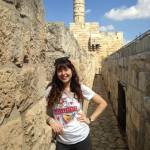Musings from Students of the Pardes Institute of Jewish Studies in Jerusalem
Posted on November 6, 2014 by Mollie Feldman
 Writing this blog post comes directly on the heels of a Pardes tiyul to Hebron. This was my first visit to Hebron, although far from my first difficult confrontation with or conversation about the current political situation in Israel. The soul searching, questioning, despair, and hope that inevitably follows this sort of trip (and – at least for me – essentially any contemplation on this matter) were all swirling around in my head when I read this week’s parashat, Vayera. As a general plot overview, Vayera gives the account of Abraham welcoming three visitors (secretly, angels) into his home. From these visitors, Abraham learns that his wife, Sarah, will conceive a child despite her old age and that Sedom is to be destroyed. Other highlights of the parashat include Abraham claiming Sarah to be his sister in the presence of Avimelech, Yitzchak being born, Hagar and Ishmael being banished from Abraham’s home, God calling on Abraham to sacrifice his son, and the divine intervention that substitutes a ram instead of Yitzchak for sacrifice at the last moment.
Writing this blog post comes directly on the heels of a Pardes tiyul to Hebron. This was my first visit to Hebron, although far from my first difficult confrontation with or conversation about the current political situation in Israel. The soul searching, questioning, despair, and hope that inevitably follows this sort of trip (and – at least for me – essentially any contemplation on this matter) were all swirling around in my head when I read this week’s parashat, Vayera. As a general plot overview, Vayera gives the account of Abraham welcoming three visitors (secretly, angels) into his home. From these visitors, Abraham learns that his wife, Sarah, will conceive a child despite her old age and that Sedom is to be destroyed. Other highlights of the parashat include Abraham claiming Sarah to be his sister in the presence of Avimelech, Yitzchak being born, Hagar and Ishmael being banished from Abraham’s home, God calling on Abraham to sacrifice his son, and the divine intervention that substitutes a ram instead of Yitzchak for sacrifice at the last moment.
Clearly, this is a parashat with intrigue, scandal, questions about justice, and plenty of juicy things to write a blog post on. Rather than focusing on a particular plot point or large question of meaning, however, I would like to draw attention to one relatively small and easily overlooked piece of the text.
Towards the very beginning of the parashat, in 18:2, “Abraham lifts his eyes [from the opening of his tent] and saw three people standing near him. He saw and ran to greet them from the opening of his tent…” The identical form of the Hebrew verb is used twice, וירא, he saw. Why the repetition? It seems repetitive and unnecessary to repeat the verb a second time – especially within the same pasuk.
Rashi interprets the repetition to mean a change in what it means to ‘see.’ With the first וירא, Abraham literally sees the angels approaching. The second time, however, means understanding. With the second seeing, Abraham understands that the approaching angels (disguised as people) mean him no trouble, enabling him to run and greet them and welcome them into his home.
Thinking about this commentary in combination with the recent trip to Hebron that I spoke about, I am struck by how we (meaning human beings) can see so differently. What we see – and, also, what we cannot see – weighs heavy on how we greet other people, welcome or reject them, and open both our homes and our hearts to the stranger that approaches. I wonder what it was that Abraham saw that allowed him to see a second time – this time as a seeing of understanding. I wonder what we (meaning human beings invested in peace in the land of Israel) can see in each other than can move us toward understanding. I wonder what Palestinians can see to find understanding beyond anger. I wonder what Israelis can see to find understanding beyond fear.
I regret to say that I don’t have answers (or even any great suggestions). I can say, however, that I am looking inside myself. I am seeking to, like Abraham, see beyond what is right in front of me and, instead, to see something below the surface, to find a different perspective, and to be open to second (or third, fourth, fifth…) seeings – each one as another opportunity to see with full understanding.